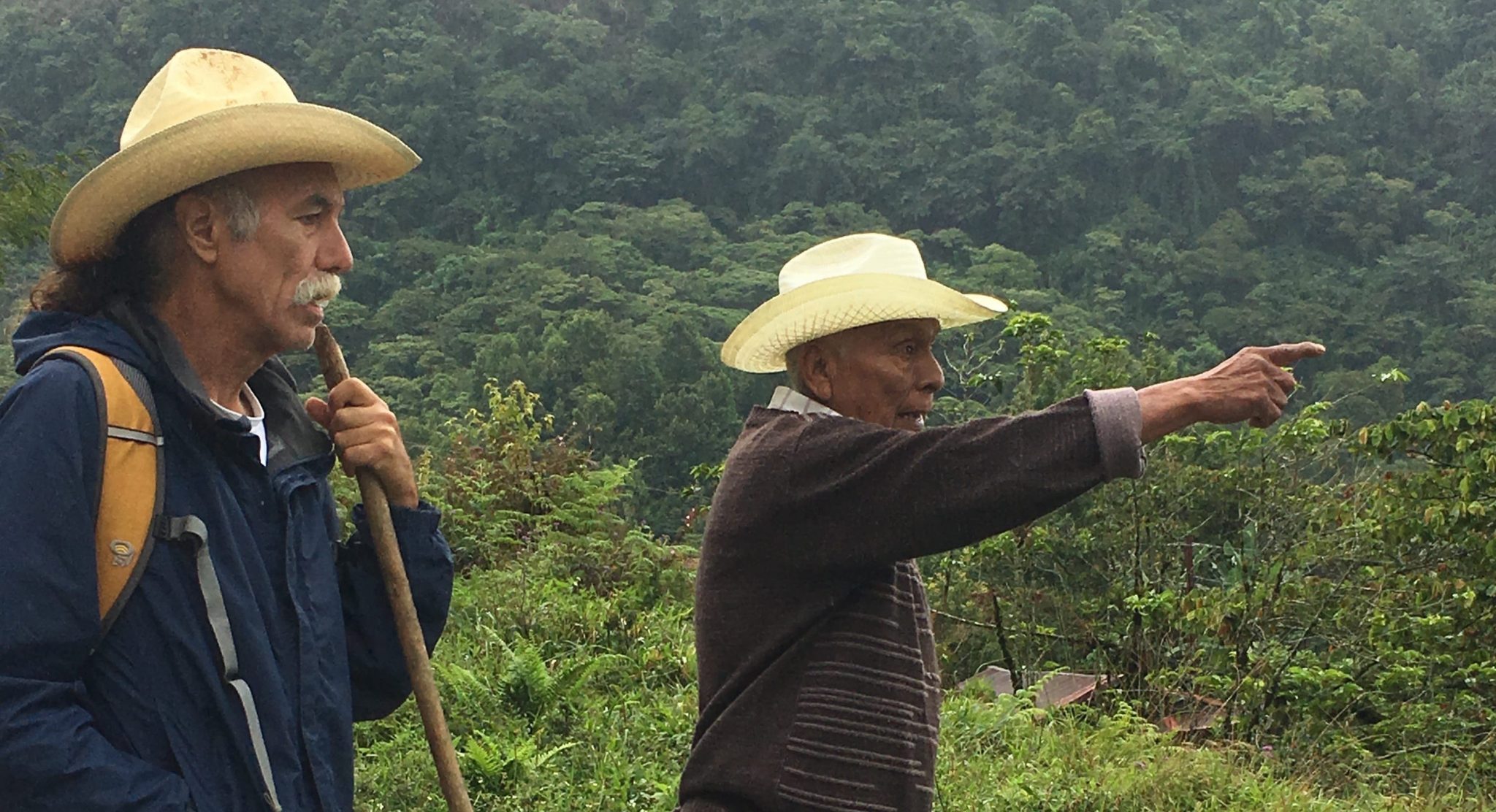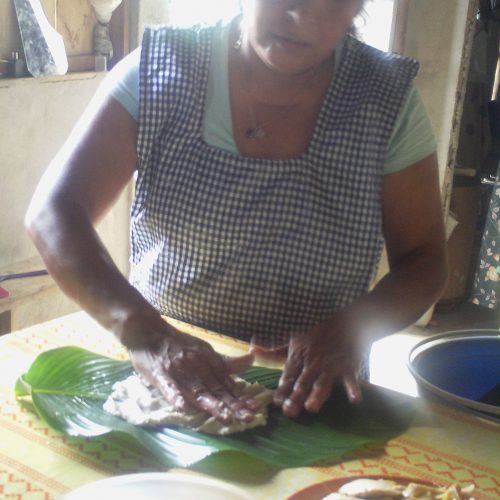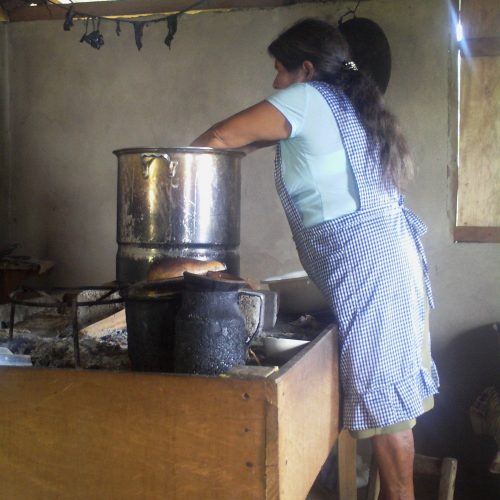‘Tracing the Steps of the Ghost Dance’ is a storytelling project about the importance of the ancient relationship between people, plants and their environment. Using the Ghost Dance ritual as our case study; we follow the spores of the Desheto mushroom to the impenetrable and majestic Cloud Forests of the Sierra Mazateca. This project is being led by our Americas project director Michael Stuart Ani, who has been a student of plant wisdom for fifty years with a deep connection to the Lakota, Yamomami and Mazateca.
This is Michael’s personal story on the time he’s spent with the Mazatecan community in his quest to find Desheto during summer 2018.
The seed of Chico Nindo and The Little Ones
Huautla de Jimenez in the Sierra Mazateca of Oaxaca, Mexico is the town I’ve spent a lifetime passing through but have never actually stayed in for more than a night. To the outside world, Huautla is the birthplace of the psilocybin mushroom religion, but for me Huautla has always been the last town in the Mazateca with a hotel and hot shower. A pit stop to rest and gather supplies before heading over the mountain and down to my long-time hideaway in the tropical cloud forest on the other side of the mountain.
Heather and I arrive in Huautla on an unseasonably dry July night in the middle of the rainy season. Our first stop: my favorite old haunt the rustic Hotel Julieta, where we settle into our room overlooking the town of Huatla. I am glad to be back in the Mazateca, but the clear night sky unnerves me. Without the rain, the chances of Desheto showing himself are next to none and he is who we are looking for. All night, I toss and turn in bed, kept awake by the lack of rain and the kind of self-doubt that only comes out in the dark. When I finally do drift off into restless dreams, it is only to be awakened before dawn by dogs fighting in the street.
Mumbling obscenities at the hounds of hell who interrupted my dreams, I stumble towards the bathroom to take a shower, closing the door so I won’t wake Heather. The hot water brings me back to life and I laugh to myself how the Hotel Julieta, a boondock, eighteen-dollar a night Mazatecan run hotel, has better hot water than half the five-star hotels in Mexico City. Ah, the magic of Mexico!
At first light I’m in the streets giving every scraggly pooch I see an accusing eye, still grumpy from my lack of sleep. As it begins to drizzle I take a deep breath of the early morning air, hopeful that the long-awaited rains will soon arrive. In the midst of my reverie, a senora with long gray braids seems to materialize out of the mist. I notice that she is selling the specially blessed beeswax candles that are used for Velada ceremonies and I know from my last visit to Huautla that these candles have become very difficult to find. Seeing her there now reassures me that if I looked carefully enough, “the Old Time Religion” is still alive, though it may be hiding deep in the shadows of Mexico.
Returning to the Hotel Julieta, I see Heather standing at the curb with our luggage. Striking, but not so inviting, Heather stands guard over our possessions like a grizzly koala in Patagonia travel wear, ready to shape-shift from adorable to claws of death if provoked. I pity any fool that tries to mess with our stuff. But in truth, Huautla had changed over the years, becoming safer and more tourist friendly. As I flag down a taxi for Chilchotla, the sun comes out and the possibility of the long awaited rain passes. The taxi that finally arrives is covered in cheesy magic mushroom stickers and as we travel through the streets I see kids everywhere hypnotized by cellphones as they walk to school. I began to feel like a living relic taking a taxi back in time, a time that seems to be receding as quickly as the road I watch disappear behind us in the rearview mirror.
After a bumpy ride around the switchback curves of the mountain, we arrive in Chilchotla, the very last pueblo at the end of the road. Chilchotla, unlike Huautla, has never become famous and so progress seems to have left this sleepy town behind and I am glad. “Ah,” I think to myself, breathing in the smell of over ripe fruit, raw meat and urine. “The good old days.”
Luckily Gordo, a local I know, is already waiting with his half demolished pickup truck in the plaza and he drives us to the edge of town where the road used to end. Now the “end of the road” extends far beyond the town, and cuts through the Cloud Forest like a sacrificial knife piercing the heart of the mountain. Off in the distance we can see Giant Caterpillar tractors carving out even more roads through the virgin soil where the Little Ones, the fruit of the Ghost Dance, once grew. Following close behind the tractors are trucks with cranes hard at work planting electrical poles in the ground.
When I first arrived in Huautla, almost fifty-years ago, the Little Ones could be found in the nearby cloud forest, but when electricity arrived, they disappeared. As the electricity gained momentum, the Little Ones abandoned the mountain of the god Chicon Tocosho and retreated to our current destination, the remote cloud forest of Chico Nindo, on the other side of the mountain. It was from Chico Nindo’s seed that the Little Ones were born during the first Ghost Dance.
With the trees cut down and the lights turned on, there were no more shadows left for the sacred mushrooms to hide under. I wondered if I’d returned too late and Desheto and the Little Ones had already gone, fading into the darkness as they faced the bright glare of an incandescent bulb.
But before I can sink into a complete state of doom and gloom, a spark of the old flame flickers as we arrive at Daniel and Lucia’s door. As our old friends come outside to greet us, I am delighted to see that Daniel has made an almost complete recovery from his fall off the side of a cliff several years ago, an improvement from the last time we were here.
When Lucia sees Heather, she smiles and says one of her favorite words: “Binky.” Binky aka Rosita or Little Rose, is the nickname they call her because it is hard for them to pronounce Heather. Then my two oldest friends look at me with a twinkle of mischief in their eyes and harmonize on what friends near and far have said to me for most of my life:
“We thought you were dead!”
I laugh and say, “No, I’m pretty sure I’m still here.”
Lucia hugs me and then squeezes “Binky” with joy. Gathering together our bags and all the food we have bought in Chilchotla, we happily make our way into Lucia’s kitchen, which has fed me so well over the years. Lucia and I have spent many hours sitting on tiny wooden chairs and talking here while sipping coffee as it rains outside; her kitchen has always been my shelter from the storm.
Now, although at first things seemed to have not changed at all, I find out soon enough that appearances can be deceiving. Lucia’s kitchen is still a near perfect time capsule of an ancient Mexican kitchen with matates, comals, clay pots, the wood fire smoke and a hint of chili pepper in the air. But even here I find that progress has arrived as Lucia stops to show me her new electric light and blender, which she demonstrates to us with great pride.
Not to be outdone, Daniel calls me to follow him next-door to the old tienda, where they once sold soda, beans, beer, soap and other practical items.
“Maguey,” he says with a very serious expression. “No one has seen Desheto in over a year and a half.”
I ask him when the electrical poles had arrived and without thinking he answers, “About a year and a half ago.”
Daniel thinks for a moment and I watch as the light bulbs go on over his head. I don’t think he has put it together until that very moment, that the electricity might be connected with Desheto’s disappearance. But for the moment he lets that “coincidence” go, eager to show me his next surprise. Swinging open the door of the tienda, he excitedly ushers me inside. Talk about an alternate reality! Behind door number 3, I am shocked to see that the tienda has been transformed into a “Viva Las Vegas,” style mini bachelor pad that this side of the cloud forest has likely never seen before.
“My son built it, so he can live here someday. This will be his home,” Daniel explains with pride.
Then my old Indio friend Daniel sits down on the couch and flicks on a TV remote, telling me that while Lucha Libre is his favorite show, Lucia prefers the telenovelas.
“You really like this fake wrestling stuff?” I ask him.
“It’s definitely not fake, says Daniel indignantly. “But even if it was, so what? Come on Maguey. I’m almost eighty-years old and can’t even read. You read or write or play your mandolin at night. I can’t do any of those things. Lucha Libre is great! Before, I only saw tele a couple times a year in the Huautla storefronts. Here I can watch it whenever I want and it makes me laugh and puts me to sleep.”
But when the female wrestlers enter the ring on the flat screen Daniel looks uncomfortable.
“I don’t like it when these city women show their little birds through their tight clothes, it’s disturbing.”
“And yet you continue to watch it?” I reply, just to bust his balls.
“True, but it makes me feel funny. Then it puts me to sleep.”
We both laugh. “But don’t you miss the good old days?” I ask him.
“Good old days, burro shit? Good old days for you,” he scoffs. “You had everything: mules, money, guns and Desheto to cover your back. We were so poor we were hungry all the time and living off the forest. Don’t you remember? Gaspar Gamboa and the other Mexicans shot us like dogs when they wanted to. That cabron killed Lucia’s poor father over eight pesos worth of aguardiente.”
“I guess those times really weren’t so good.” I agree.
Daniel jokes as he flicked through the channels on the remote control. “I’m just messing with you. I know that we also lost plenty in the deal. When we gave up the gods of nature for Jesus the old gods turned on us. The climate changed, the rains don’t come and the coffee is gone, nothing grows the same. I think that maybe Jesus is a better god than he is a farmer. But the ladies here really love him and his gifts, the electricity, the road and the church of course, where they meet to complain about the men.”
“What about the lack of water that the locals are about to kill each other over and the smell of car fumes? I bet they don’t love that?” I poke.
Daniel shrugs it off. “I don’t know, I like the smell of truck exhaust, it makes me feel more connected to my country, more Mexican.”
I grin and we both crack up laughing. Then Daniel stops abruptly.
“Really, thank god you’re here, no joke, the water is drying up and it won’t rain. We’re in trouble, seriously. You know how people get when they run out of water.
“I know.”
“Can you dance with La Pastora or the White Man’s Saints, if we can’t find the Little Ones?”
I just look at Daniel and because he already knows the answer, he answers himself.
“Then we’ll just have to find them. If the Little Ones are anywhere, they’re hidden away in some spot where it is always wet. Who knows if I’ll get lucky, but tomorrow I’ll go searching for them in a place that even you don’t know about.”
So, I leave the tienda on a high note and go to bed. For the past two nights I have barely slept, and when I did lay down I had a freight train running through a tunnel in the middle of my head. Tonight, Heather rubs my back, but it brings no relief. I am hanging on the travel worn edge of sleep praying for rain, and trying, despite the evidence, to believe that Desheto is still alive.
TO BE CONTINUED…
HELP US CONTINUE THE STORY,
For this first part of this project, Michael Stuart Ani visited the Sierra Mazateca to trace the origins of the Ghost Dance and the mysterious Desheto mushroom. Next we intend to follow the ceremony northwards to the Lakota of the Sioux Nations in the United States of America.
Want to find out what led to the Wounded Knee Massacre and the outlawing of the Ghost Dance? Then please make a donation and help us continue the project by sending Michael to meet his old friends, the medicine men of the Lakota people.
Read more about our other projects here
- Coverphoto shows Michael and Daniel on their quest for Desheto in the Sierra Mazateca



